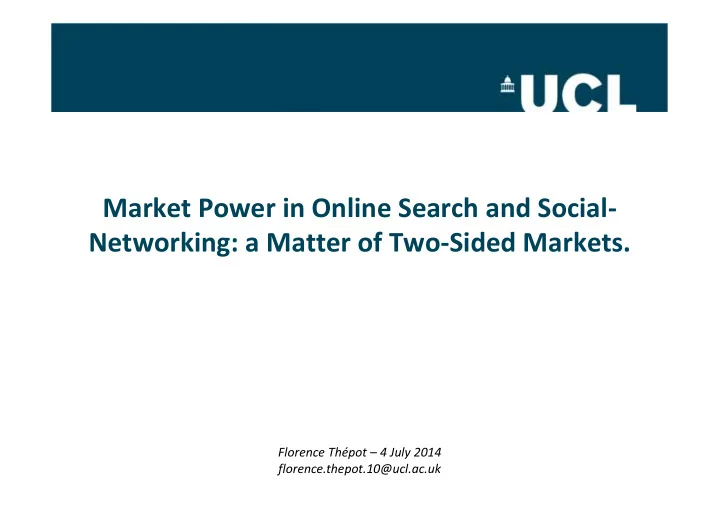

Market Power in Online Search and Social- Networking: a Matter of Two-Sided Markets. Florence Thépot – 4 July 2014 florence.thepot.10@ucl.ac.uk
Overview • Context: Recent Google investigations in EU and US • Almunia “Dominance on the internet is difficult to establish […] Even the basic concepts such as the definition of a market can become quite tricky in these markets.” • Market definition and assessment of market power need to account for the particularities of these markets, known as two- sided markets • Facebook and Google: possible competitors?
Two-sided markets : key concepts � Indirect network effect & positive feedback between the user groups. � Price-cost margin on one side also depends on the elasticity of demand & price-cost margin on the other side. � Role of the intermediary/platform: internalise externalities, reduce transaction costs: Matchmaking (nightclub), Building audience (advertiser based platforms). � Some fallacies of applying one-sided logic to Two-sided markets.
Google & Facebook, examples of two-sided markets. ����������� ����� ������������������������ ��� �������� ����
Google & Facebook, examples of two-sided markets. ���������������������� ����� ����������� ����� ����� ������������������������
�������������������������� � Market definition – Issues of market definition on each side taken separately : 1) users and 2) advertisers. – Market definition of the platform as a whole � Assessment of market power – Barriers to entry – Switching costs
������������������������������������� � Online search � Google, general search engine � Different from 'vertical search engine' and from integrated search tool. � No 'offline' equivalent. � Social-networking � Facebook, 'general' social-networking website. � Different from 'vertical' social-networking � No offline equivalent'.
��������������������������������������� ���� � Offline and Online advertising in the same market? Do offline and online advertising constrain each other's pricing? � Empirical studies (Goldfard & Tucker) : probably YES. � European Commission : NO � Search – advertising v. non-search advertising in the same market ? � European Commission : probably YES
���������������������������������������� ����� � Avoid too formalistic approach and focus on competitive constraints on each side of the platform Possible relevant markets : � Online search/social-networking : NO � Online advertising : probably not as it ignores the user's side � Monetization of general users information (e.g identity, interest, purchase aims..) to advertisers: probably? ..but not in the near future. � D. Evans: « market for attention »
�������������������������� �� ��������������� � Barriers to entry � Indirect network effects more than cost of technology ? � Dynamic rather than static competition : entry over time. eg. MySpace and Facebook. � Switching cost � Multihoming and 'competition one click away' � User's loyalty to Google, difficulty to close one FB's account. � Advertisers : few incentives to switch to smaller platform ?
���������� • Need for a two-sided market approach to market power in online search and social-networking industries • Facebook and Google ? 1 or 2 markets ? • D. Evans: « The Attention Market is a great place to make a fortune but to lose it as well.”
Recommend
More recommend